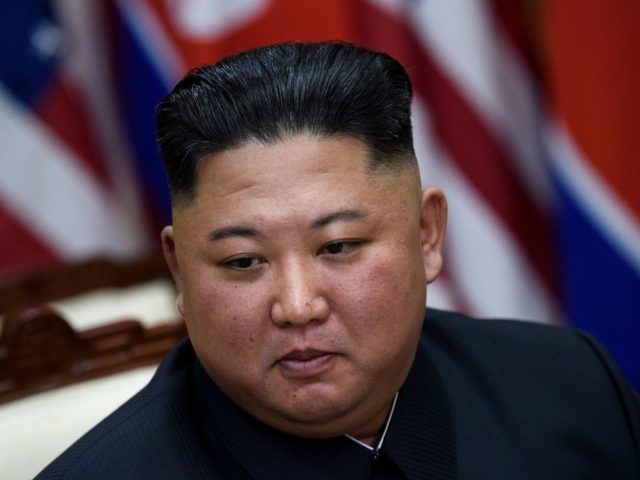Kim Jong-un told members of his ruling communist party Wednesday that North Korea’s agricultural sector had “failed” and that the “people’s food situation is now getting tense,” the latest in a series of similar warnings that the nation is on the brink of famine.
Kim himself triggered global speculation last week appearing in photos in which he seemed to have experienced a dramatic loss of weight. North Korea has not commented on any weight fluctuations or health issues the dictator may be facing.
The warning occurred at a plenary meeting of the ruling Workers’ Party of Korea (WPK), the repressive political body of the Kim family, on Wednesday. According to the state-run Korean Central News Agency (KCNA), Kim mentioned among the potential challenges to North Korea’s food supply the ongoing Chinese coronavirus pandemic. North Korea is one of the only nations in the world to have officially documented zero cases of Chinese coronavirus within its borders – a claim most international experts reject as false – but has reportedly begun importing vaccines and asking the World Health Organization (W.H.O.) for greater access to vaccine products.
North Korea imposed a strict border shutdown following the emergence of the pandemic that dramatically limited the illicit access Chinese traders typically enjoyed to the North Korean market, and vice versa, along the Yalu River, a mutual border. In September, General Robert B. Abrams, commander of U.S. Forces Korea (USFK), stated that American officials believe Kim imposed “shoot-to-kill” orders for those seeking to cross the border.
The nation, like neighboring China, also endured severe flooding for much of last summer, causing tremendous damage to crops and ravaging North Korea’s impoverished countryside.
“The subjective and objective conditions and environment for the revolutionary struggle have become worse upon entering this year but the country’s economy has shown improvement as a whole,” Kim reportedly told his party Wednesday, according to KCNA.
“Saying that in particular, the people’s food situation is now getting tense as the agricultural sector failed to fulfill its grain production plan due to the damage by [the] typhoon last year, he stressed that the plenary meeting should take a positive measure for settling the problem,” he added.
Another senior North Korean official, Ri Chol Man, similarly emphasized the importance of Pyongyang ensuring a “good crop” to feed the population.
“Having a good crop is a militant task our Party and state must fulfill as a top priority issue to provide the people with a stable life and successfully step up socialist construction,” KCNA paraphrased Ri as saying, adding that “it is essential for the whole Party and state to concentrate on farming from a lesson of last year’s farming and under this year’s unfavorable conditions.”
The leaders deviated from the typical claims that the nation’s economic hardships were exclusively the product of international sanctions on North Korea’s illegal nuclear weapons program, instead admitting that “natural disaster” was behind the poor crop yield. Ri reportedly stated that natural disaster damages were “getting even more serious” and North Korea needed to invest in meteorological monitoring to better prepare for flooding like last year’s.
International observers noted that the poverty and food supply situation within North Korea appeared to have reached devastating proportions in October when Kim Jong-un sobbed on national television during a speech and apologized profusely to his people.
“Our people have placed trust, as high as sky and as deep as sea, on me, but I have failed to always live up to it satisfactorily. I am really sorry for that,” Kim said, according to a translation by state newspaper Rodong Sinmun. “Although I am entrusted with the important responsibility to lead this country … my efforts and sincerity have not been sufficient enough to rid our people of the difficulties in their life.”
“I solemnly swear once again in this place that I will live up to the people’s trust without fail even if my body is torn and crushed to pieces on the way of defending their great trust and that I will remain faithful to that trust,” he promised.
Kim never elaborated on how or by what measure he had “failed.”
Radio Free Asia (RFA) reported Monday that food prices in the country are either skyrocketing, partly due to shortages, or fluctuating wildly, leaving many citizens baffled.
“I don’t understand why food prices and exchange rates are constantly changing. Yesterday the exchange rate for the U.S. dollar was 6,100 won, but it went down to 5,300 in the evening,” an unnamed source in North Korea told the outlet.
“The period of the year from May to June is called the barley hump, when grain stocks produced last year are nearly exhausted so the increase in food prices is inevitable,” another anonymous source within North Korea told RFA. “This year, due to strict quarantine rules because of the coronavirus, and with the Chinese border still being closed–meaning there are no food imports–it’s all going to lead to a further increase in food prices.”
A third lamented, “I’ve never seen food prices rise so steeply like this, not even during the outbreak of the coronavirus, even after the border was completely sealed off and food routes from the outside were blocked.”
The United Nations revealed in a report published in March that it had evidence of “deaths by starvation” within the country and the exacerbation of a “serious food crisis.”

COMMENTS
Please let us know if you're having issues with commenting.